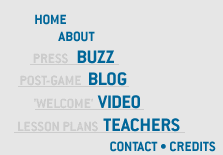LESSON ONE:
Oil Crisis: Get into the Game
Introduction
A global oil crisis has begun. Oil usage worldwide has increased to where the
oil supply can only meet 95% of it. This lesson imagines the day when this
reality first hits the news, and asks your students to get into the game by
playing it as if it were really happening in their lives. Their inquiry into the
effects of less oil in the world around them and their personal search for ways
to live well while consuming less energy will bring up issues about petroleum
use and allocation, renewable and non-renewable resources, the role of energy in
economy and culture, and many others.
In this and succeeding lessons, you will present developments in the oil
crisis as though they were really happening, and ask the students to deal
realistically and personally with the life-changing reality of this oil
shortage. As their inquiry brings up topics and issues, you can use resource
information we provide to enhance students' understanding.
Lesson Objectives
Students will:
-
Immerse themselves in the realistic World Without Oil (WWO) scenario.
-
Examine the facts about oil consumption in the United States and the
world.
-
Develop a basic understanding of the relationships among supply, demand,
price and availability of a resource in a market economy.
-
Develop a basic understanding of the "life cycle" of a non-renewable
resource (the Hubbert curve).
-
Begin to develop strategies predicated upon anticipated events.
-
Begin to reflect on the life changes that would occur in a prolonged oil
shortage, a process that will continue and develop throughout the World
Without Oil lessons.
Before the Lesson
- Read the Week 1 news report at WWO:
http://www.worldwithoutoil.org/weekly.aspx?week=1
- Review "Petroleum Products in our Daily Lives": http://www.worldwithoutoil.org/metalesson1s.htm
and identify 10-15 products that might most impact your students' lives.
- Preview the resource materials (links below).
- Prepare your own "in-game" reaction to the events unfolding in World Without
Oil. How will an oil shortage affect you personally? What most worries you? What actions are you
taking in response? What can the common people do to make things better? If you can, blog it and have your students follow your blog.
Part 1: Set the Stage
Student Page for this lesson is here:
http://worldwithoutoil.org/metalesson1s.htm
This page summarizes ideas and instructions for students.
- Introduce the situation to the class: "Did you hear? Oil prices
increased dramatically today. They say a shortage is coming!
Here, watch this video." Get "into game" and act as though the oil crisis were really happening, lapsing "out of game" only when it's necessary for students' understanding.
-
Show Kal's first video - "Oil Spike!"
http://www.youtube.com/watch?v=mqnu2zXR4dM
and Anda's webcomic about college students:
http://anda-sf.livejournal.com/835.html
- Introduce the challenge: students must immerse themselves in this new reality, and figure out how the
coming shortage will affect them and their families in order to avoid the worst of its impacts. What risks to their quality of life do they see? What will each
student do in response to these risks? Encourage them to get "in game" throughout the WWO lessons.
- Introduce the related ideas of "collective intelligence," "crowdsourcing" and "citizen journalism." Put forth this thesis: "Oil is such a pervasive part of modern life that it will take all of us working together to plot out and chronicle the impacts of an oil shortage."
Part 2: Take Action
-
Divide the students in groups of three to five students. NOTE: Most of the lessons will involve some level of student collaboration and discussion. You may want to select groups based upon ability level and maintain the same groups throughout the World Without Oil lessons.
-
Have each student group discuss the following questions:
-
What are your initial reactions to a spike in fuel prices and the
coming oil shortage?
-
How might your life have to change? How serious are those changes? How
ready are you to make them?
-
How do you think life might change for other people? Will this affect
you?
-
Why did oil prices rise so fast? Why did the announcement "an
oil shortage is coming" cause fuel prices to rise immediately?
-
Some say that in the United States we are "addicted to oil." Do you
see truth in that statement? Why or why not?
- Have the students read reactions from WWO players, and compare these ideas to their own. Assign a different pair to each group:
- Have one member from each group share the group's overall reactions. Record the key points made by each group. Keep this list and as events unfold during the game, discuss how perceptions have changed and add new items.
Part 3: Lesson Activity
- How well did your students do in discerning the pervasive effects of oil in our culture? Did they realize that petroleum is necessary for many products besides fuel? Present the products you selected from "Petroleum Products in our Daily Lives":
http://www.worldwithoutoil.org/metalesson1a.htm
- Did your students discern that oil is indirectly necessary for almost all products and services today? Beyond the direct connections (transportation and other direct energy generation, petroleum products), did they think of all the
indirect connections:
- oil moved the tractor that grew my food
- oil moved the truck that brought iPods to my store
- oil mined the coal that generated the power that pumped water to my city
- oil moved the ambulance that took my Aunt Martha to the hospital so that my cousin Samantha could be safely born
Could we have seen this oil crisis coming? Give an overview about oil production and consumption.
Part 4: Reflect
You've immersed the students in the crisis; given them an initial
understanding of the very real problems they and their families might face
there; begun to explore the intricate connections we all have to cheap energy from oil; and established the reality of the world's oil situation. For
their first reflection, have students share their first reactions to the
current situation. Use the following question to help guide their
reflections:
-
How are you personally connected to oil and what does this crisis mean
to you? It can incorporate your new understanding of oil and
changes that you personally may have to make if the situation worsens.
Part 5: Take it Further
Distribute this to your students (and if appropriate refer them to your blog):
You've learned a lot today about oil and its role in modern society. To take it further
today, get seriously into the game:
- Read the Week 1 news report at World Without Oil: http://www.worldwithoutoil.org/weekly.aspx?week=1
- Prepare your own "in-game" reaction to the events unfolding in World Without Oil. How will an oil shortage affect you personally? Looking ahead, what most worries you? What actions are you taking in response? What can the common people do to make things better?
Post your findings on your blog, and if you can, add photographs, drawings, audio files, or video.
Additional Resources
National Standards (McREL)
Overarching (All Lessons)
Standard 44.
Understands the search for community, stability, and peace in an interdependent world
Level IV (Grades 9-12), Benchmark 2:
Understands rates of economic development and the emergence of different economic systems around the globe (e.g., systems of economic management in communist and capitalist countries, as well as the global impact of multinational corporations; the impact of black markets, speculation, and trade in illegal products on national and global markets; patterns of inward, outward, and internal migration in the Middle East and North Africa, types of jobs involved, and the impact of the patterns upon national economies; the rapid economic development of East Asian countries in the late 20th century, and the relatively slow development of Sub-Saharan African countries)
Lesson 1: Specific Standards
Economics
Standard 2: Understands characteristics of different economic systems, economic institutions, and economic incentives
Level IV, Benchmark 1: Understands that the effectiveness of allocation methods can be evaluated by comparing costs and benefits
Level IV, Benchmark 5: Understands that in every economic system consumers, producers, workers, savers, and investors respond to incentives in order to allocate their scarce resources to obtain the highest possible return, subject to the institutional constraints of their society
Standard 3: Understands the concept of prices and the interaction of supply and demand in a market economy
Level IV, Benchmark 1: Understands that the demand for a product will normally change (i.e., the demand curve will shift) if there is a change in consumers’ incomes, tastes, and preferences, or a change in the prices of related (i.e., complementary or substitute) products
Level IV, Benchmark 5: Understands that shortages or surpluses usually result in price changes for products in a market economy
Standard 4: Understands basic features of market structures and exchanges
Level IV, Benchmark 6: Understands that a natural monopoly exists when it is cheaper for one supplier to produce all of the output in a market than for two or more producers to share the output (e.g., electric companies)
Level IV, Standard 5: Understands unemployment, income, and income distribution in a market economy
Level IV, Benchmark 2: Understands the concept of supply and demand in the labor market
Geography
Standard 5: Understands strategies used in natural resource management and conservation
Level IV, Benchmark 5: Knows traditional energy sources (e.g., petroleum, coal, wood) as well as alternative energy sources (e.g., wind, solar, geothermal, hydropower, biofuels)
Standard 16: Understands the changes that occur in the meaning, use, distribution and importance of resources
Level IV, Benchmark 2: Understands programs and positions related to the use of resources on a local to global scale
Level IV, Benchmark 3: Understands the impact of policy decisions regarding the use of resources in different regions of the world
United States History
Standard 31: Understands economic, social, and cultural developments in the contemporary United States
Level IV, Benchmark 1: Understands how changes in the national and global economy have influenced the workplace
State Standards (All Lessons)
![]()
![]()
![]()
![]()
![]()
![]()
![]()
![]()
![]()
![]()
![]()






